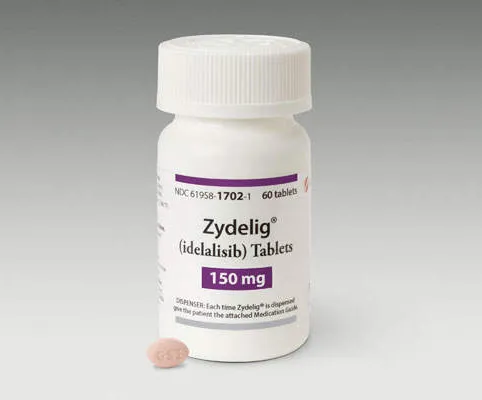Comprehensive Guide to Idelalisib: Uses, Dosage, Side Effects, and More
What is Idelalisib?
Overview of Idelalisib
Generic Name: Idelalisib
Brand Name: Zydelig, generics
Drug Group: PI3K inhibitor (antineoplastic)
Commonly Used For
- Treat chronic lymphocytic leukemia (CLL).
- Manage relapsed follicular lymphoma (FL).
- Address relapsed small lymphocytic lymphoma (SLL).
Key Characteristics
Form: Oral tablets (100 mg, 150 mg) (detailed in Dosage section).
Mechanism: Inhibits PI3Kδ to halt B-cell survival and growth signals.
Approval: FDA-approved (2014 for Zydelig) and EMA-approved for hematologic malignancies.

Indications and Uses of Idelalisib
Idelalisib is indicated for specific hematologic malignancies and related conditions, leveraging its targeted PI3K inhibition:
Chronic Lymphocytic Leukemia (CLL): Treats relapsed or refractory CLL in combination with rituximab, per oncology guidelines, supported by clinical trials showing improved progression-free survival (PFS) by 57% compared to placebo.
Relapsed Follicular Lymphoma (FL): Manages FL in patients who have received at least two prior systemic therapies, recommended in lymphoma treatment protocols with evidence of tumor reduction in 54% of cases.
Relapsed Small Lymphocytic Lymphoma (SLL): Addresses SLL with prior treatment failure, with hematology data indicating partial response rates of 58%.
Waldenström Macroglobulinemia: Investigated off-label to reduce IgM levels and lymphadenopathy, with lymphoma research.
Marginal Zone Lymphoma (MZL): Explored off-label in relapsed cases, improving lymph node response, per oncology studies.
Autoimmune Hemolytic Anemia (AIHA): Managed off-label in CLL-associated AIHA, with hematology-immunology evidence.
Graft-Versus-Host Disease (GVHD): Initiated off-label to control chronic GVHD post-transplant, with transplant medicine data.
Primary Central Nervous System Lymphoma (PCNSL): Investigated off-label for refractory cases, with neuro-oncology research.
T-Cell Lymphomas: Explored off-label in peripheral T-cell lymphomas, with preliminary oncology findings.
Immunotherapy Adjunct: Used off-label to enhance checkpoint inhibitor efficacy in lymphoma, with immunotherapy studies.
Dosage of Idelalisib
Dosage for Adults
CLL (with Rituximab): 150 mg twice daily until disease progression or unacceptable toxicity, typically for 6–12 months or longer.
Relapsed FL or SLL: 150 mg twice daily as monotherapy until disease progression or intolerance, often maintained for 3–6 months with response assessment.
Off-Label Use (e.g., MZL or GVHD): 100–150 mg twice daily, adjusted based on tolerance and efficacy, under specialist supervision.
Dosage for Children
Not Established: Use is off-label and not recommended due to lack of safety data; consult a pediatric oncologist if considered.
Dosage for Pregnant Women
Pregnancy Category D: Avoid unless benefits outweigh risks; consult an obstetrician and oncologist, with fetal monitoring and alternative therapies considered.
Dosage Adjustments
Renal Impairment:
Mild to moderate (CrCl 30–80 mL/min): No adjustment; monitor closely.
Severe (CrCl <30 mL/min): Avoid due to limited data on clearance.
Hepatic Impairment:
Mild (Child-Pugh A): 100 mg twice daily; moderate to severe (Child-Pugh B or C): Avoid due to hepatotoxicity risk.
Concomitant Medications: Reduce dose or avoid with strong CYP3A4 inhibitors (e.g., ketoconazole) or inducers (e.g., rifampin); monitor liver enzymes.
Elderly: No specific adjustment; assess liver and infection risk.
Toxicity Management: Interrupt or reduce to 100 mg twice daily if grade 3/4 adverse events (e.g., neutropenia, transaminitis) occur.
Additional Considerations
- Take this active ingredient orally with or without food, swallowing tablets whole.
- Avoid grapefruit juice or Seville oranges due to CYP3A4 interaction.
- Use prophylactic antimicrobials (e.g., Pneumocystis jirovecii pneumonia prophylaxis) as recommended by an oncologist.
How to Use Idelalisib
Administration:
Oral: Take 150 mg tablets twice daily (morning and evening), with a full glass of water, at consistent intervals.
Do not crush, chew, or split tablets to ensure proper absorption.
Timing: Administer at the same times daily to maintain steady blood levels.
Monitoring: Watch for fever, jaundice, or signs of infection (e.g., cough, sore throat); report changes immediately.
Additional Tips:
- Store at 20–25°C (68–77°F), protecting from moisture and light.
- Keep out of reach of children; dispose of unused tablets per local regulations.
- Educate patients on infection prevention (e.g., hand hygiene, avoiding crowds) due to immunosuppression.
- Schedule regular blood tests (e.g., CBC, liver function) every 2 weeks for the first 3 months, then monthly.
- Avoid live vaccines during therapy to prevent severe reactions.
Contraindications for Idelalisib
Hypersensitivity: Patients with a known allergy to Idelalisib or its components.
Severe Hepatic Impairment: Contraindicated in Child-Pugh Class C due to hepatotoxicity risk.
Active Infections: Avoid in uncontrolled systemic infections (e.g., hepatitis, tuberculosis) until resolved.
Pregnancy: Contraindicated in pregnancy (Category D) due to fetal harm.
Severe Neutropenia: Contraindicated if absolute neutrophil count (ANC) <500/µL unless benefits outweigh risks.
Recent Live Vaccines: Avoid within 4 weeks of vaccination due to immunosuppression.
Severe Renal Impairment: Contraindicated in CrCl <30 mL/min due to limited excretion data.
Warnings & Precautions for Idelalisib
General Warnings
Severe Infections: Risk of Pneumocystis jirovecii pneumonia (PJP), cytomegalovirus (CMV), and other opportunistic infections; initiate prophylaxis.
Hepatotoxicity: Risk of transaminitis or liver failure; monitor ALT/AST every 2 weeks for 3 months.
Neutropenia: Risk of severe low white blood cell counts; check ANC regularly.
Diarrhea/Colitis: Risk of severe gastrointestinal toxicity; manage with supportive care or dose interruption.
Skin Reactions: Risk of rash or toxic epidermal necrolysis; discontinue if severe.
Additional Warnings
Pneumonitis: Rare interstitial lung disease; monitor for dyspnea or cough.
Intestinal Perforation: Rare risk; assess abdominal pain promptly.
Cardiac Toxicity: Rare QT prolongation; monitor ECG in at-risk patients.
Immunosuppression: Increased risk of malignancies (e.g., skin cancer); advise sun protection.
Hypersensitivity Reactions: Rare anaphylaxis; stop if swelling or rash occurs.
Use in Specific Populations
Pregnancy: Category D; avoid and use contraception during and for 1 month after therapy.
Breastfeeding: Contraindicated; discontinue nursing due to potential infant harm.
Elderly: Higher infection risk; monitor closely.
Children: Not recommended due to lack of safety data.
Renal/Hepatic Impairment: Adjust or avoid based on severity.
Additional Precautions
- Inform your doctor about liver disease, recent infections, or vaccination history before starting this medication.
- Avoid alcohol to reduce liver strain during therapy.
- Use antimicrobial prophylaxis as directed by an oncologist.
Overdose and Management of Idelalisib
Overdose Symptoms
- Nausea, diarrhea, or elevated liver enzymes.
- Severe cases: Hepatotoxicity, severe neutropenia, or sepsis from immunosuppression.
- Fever, jaundice, or abdominal pain as early signs.
- Coma or multi-organ failure with extremely high doses.
Immediate Actions
Contact the Medical Team: Seek immediate medical help if overdose is suspected.
Supportive Care: Monitor liver function, CBC, and vital signs; provide hydration and antibiotics if infection occurs.
Specific Treatment: No specific antidote; manage symptoms (e.g., granulocyte colony-stimulating factor for neutropenia).
Monitor: Check ALT/AST, ANC, and infection markers for 48–72 hours; consult a toxicologist if needed.
Patient Education: Advise against doubling doses and to store securely.
Additional Notes
- Overdose risk is linked to dosing errors; store in a child-proof location.
- Report persistent symptoms (e.g., yellowing skin, high fever) promptly to prevent complications.
Side Effects of Idelalisib
Common Side Effects
- Diarrhea (40–50%, managed with loperamide)
- Fatigue (30–40%, improved with rest)
- Nausea (20–30%, relieved with food)
- Rash (15–25%, treated with topical steroids)
- Fever (10–20%, controlled with antipyretics)
These effects may subside with dose adjustment or supportive care.
Serious Side Effects
Seek immediate medical attention for:
- Hepatic: Transaminitis, jaundice, or liver failure (ALT/AST >5x ULN).
- Infectious: PJP, CMV, or sepsis (fever, cough, dyspnea).
- Hematologic: Severe neutropenia (ANC <500/µL) or thrombocytopenia.
- Gastrointestinal: Colitis or perforation (severe abdominal pain).
- Allergic: Anaphylaxis or Stevens-Johnson syndrome (rare).
Additional Notes
Regular monitoring with liver function tests (every 2 weeks for 3 months) and CBC (weekly initially) is essential to detect toxicity early.
Patients with a history of hepatitis should be screened for reactivation (e.g., HBV DNA) before and during therapy.
Prophylactic antimicrobials (e.g., trimethoprim-sulfamethoxazole) should be considered for PJP prevention.
Report any unusual symptoms (e.g., persistent diarrhea, skin peeling) immediately to an oncologist to address severe adverse events.
Long-term use (>6 months) requires dermatologic exams for skin cancer risk.
Drug Interactions with Idelalisib
This active ingredient may interact with:
- CYP3A4 Inhibitors: Increases levels (e.g., ketoconazole); reduce dose to 100 mg twice daily.
- CYP3A4 Inducers: Decreases levels (e.g., rifampin); avoid or monitor efficacy.
- Immunosuppressants: Enhances infection risk (e.g., cyclosporine); use cautiously.
- Live Vaccines: Contraindicated due to immunosuppression.
- Antacids: May reduce absorption; separate administration by 2 hours.
Action: Provide your healthcare provider with a complete list of medications.
Patient Education or Lifestyle
Medication Adherence: Take this PI3K inhibitor as prescribed for cancer treatment, following the twice-daily schedule.
Monitoring: Report fever, jaundice, or signs of infection immediately.
Lifestyle: Avoid crowds and maintain hygiene to reduce infection risk; use sunscreen.
Diet: Take with or without food; avoid grapefruit products.
Emergency Awareness: Know signs of liver failure or severe infection; seek care if present.
Follow-Up: Schedule regular check-ups every 2 weeks for 3 months to monitor liver, blood counts, and response.
Pharmacokinetics of Idelalisib
Absorption: Oral, peak at 1–2 hours; bioavailability ~50–60%.
Distribution: Volume of distribution ~20–30 L; 84–93% protein-bound.
Metabolism: Hepatic via CYP3A4 and aldehyde oxidase to GS-563117 (active metabolite).
Excretion: Primarily fecal (57–78% as metabolites); renal (14%); half-life 8–10 hours.
Half-Life: 8–10 hours, with steady-state at 5–8 days.
Pharmacodynamics of Idelalisib
This drug exerts its effects by:
Inhibiting PI3Kδ to block AKT/mTOR signaling, inducing apoptosis in malignant B-cells.
Reducing lymphoid tissue infiltration in CLL and lymphomas.
Exhibiting dose-dependent risks of hepatotoxicity and immunosuppression.
Storage of Idelalisib
- Temperature: Store at 20–25°C (68–77°F); protect from moisture and light.
- Protection: Keep in original container, away from heat and humidity.
- Safety: Store in a secure location out of reach of children and pets due to toxicity risk.
- Disposal: Dispose of unused tablets per local regulations or consult a pharmacist.
Frequently Asked Questions (FAQs)
Q: What does Idelalisib treat?
A: This medication treats certain blood cancers.
Q: Can this active ingredient cause diarrhea?
A: Yes, diarrhea is common; manage with medication if needed.
Q: Is Idelalisib safe for children?
A: No, not recommended due to lack of data.
Q: How is this drug taken?
A: Orally as tablets, twice daily.
Q: How long is Idelalisib treatment?
A: Until progression or intolerance, often months to years.
Q: Can I use Idelalisib if pregnant?
A: No, avoid; consult a doctor.
Regulatory Information
This medication is approved by:
U.S. Food and Drug Administration (FDA): Approved in 2014 (Zydelig) for CLL, FL, and SLL.
European Medicines Agency (EMA): Approved for relapsed CLL and lymphomas.
Other Agencies: Approved globally for hematologic cancers; consult local guidelines.
References
- U.S. Food and Drug Administration (FDA). (2023). Zydelig (Idelalisib) Prescribing Information.
- Official FDA documentation detailing the drug’s approved uses, dosage, and safety.
- European Medicines Agency (EMA). (2023). Idelalisib Summary of Product Characteristics.
- EMA’s comprehensive information on the medication’s indications and precautions in Europe.
- National Institutes of Health (NIH). (2023). Idelalisib: MedlinePlus Drug Information.
- NIH resource providing detailed information on the drug’s uses, side effects, and precautions.
- World Health Organization (WHO). (2023). WHO Model List of Essential Medicines: Idelalisib.
- WHO’s consideration of Idelalisib for cancer therapy.
- Blood. (2022). Idelalisib in Lymphomas.
- Peer-reviewed article on Idelalisib efficacy (note: access may require a subscription).
